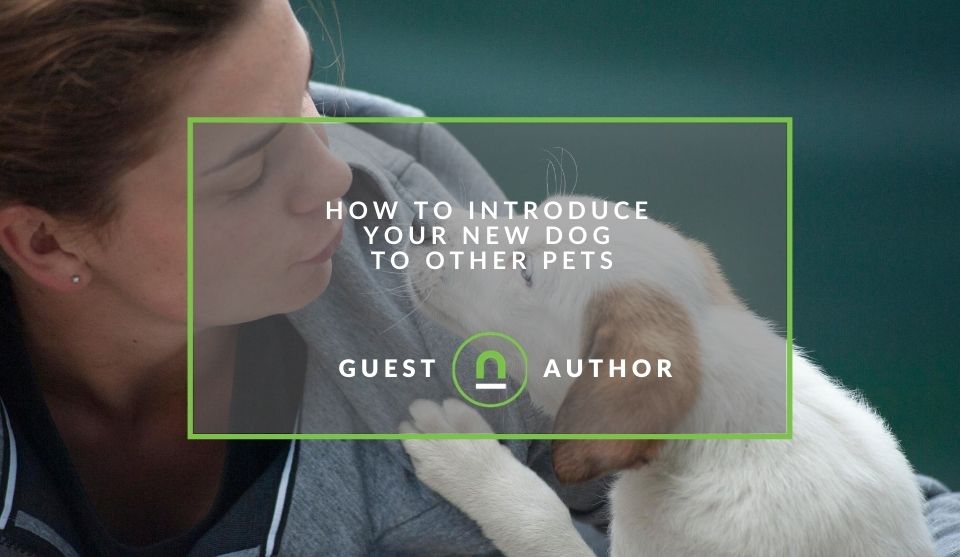Recent posts

Industry Experts
How Link Building Works for E-Commerce Businesses?
28 December 2024

Industry Experts
A Comprehensive Guide to Flyer Design: Digital & Physical Distribution
26 December 2024

Money Talks
Why Is There A Surge in Bitcoin Adoption in South Africa
24 December 2024

Money Talks
How To Safely Open Forex Trading Accounts in 2024
18 December 2024
Popular posts
Extravaganza
Trending Music Hashtags To Get Your Posts Noticed
24 August 2018
Geek Chic
How To Fix iPhone/iPad Only Charging In Certain Positions
05 July 2020
Extravaganza
Trending Wedding Hashtags To Get Your Posts Noticed
18 September 2018
Money Talks
How To Find Coupons & Vouchers Online In South Africa
28 March 2019
How To Introduce Your New Dog To Other Pets
24 July 2020 | 0 comments | Posted by Luke Fitzpatrick in Fur, Fins & Feathers
The first rule of dog ownership: do your research, and this goes for bringing your dog home too. Part of figuring out the best way to introduce your new dog to your existing animals is doing plenty of reading on the breed you've chosen as each breed, and indeed each dog may react differently.
While comfortable for you already, your home is a whole different world for your dog with new places, new people, and in this case, new animals for him to figure out. While some dogs will integrate seamlessly, others will take some time.
Tips and tricks
There are three main areas you need to consider when integrating your new dog into your family—first, the space itself. Second, the people. And third, any other animals.
Creating a safe space
When it comes to the space, make it as homely as possible. Ensure your new dog has its bed, water bowl and food bowl, and of course, its toys. Also, make sure you have all the supplies it will need, including a collar and leash, crate, and some treats. Puppy-proof everything and create safe zones for your pooch, even if you're bringing home an older dog, as they can regress when in new environments and ensure you and any family members are calm when the dog arrives.
Everyone has to play their part
When it comes to people, the first step is making sure every family member is on the same page, especially when it comes to feeding the dog, where it will sleep, and whether there are any areas of the house that will be off-limits. The most important thing to remember is to keep it as low-key as possible. You'll be strangers to the dog at first, so it's best to keep the house as calm and mellow as possible, at least for the first few days.
Meeting of the dogs
One of the most challenging things that may arise is introducing your new dog to your existing one. There are lots to consider here. But the most important thing is to ensure that both of your dogs are not threatened by territory.
For some, choosing an older dog is the answer as they tend to be less energetic than young puppies and in general, less threatening to existing pets. Of course, older dogs do come with their own needs and at times, may need a little bit of extra help feeling secure.
Ease them into the new environment
Before your dogs even meet, it's a good idea to get someone to take your existing dog out and about while you bring your new dog into the house for the first time. That way, your new dog can smell the existing one, without the stress of actually meeting him. During this time as well, your new dog will be able to familiarise himself with his new home. Then, take him to a park to meet your existing dog.
This way, the first meeting of the dogs on neutral territory. And remember to bring treats for both pups to reward them for good behaviour.
Don't leave anything to chance
When you take both dogs home, make sure anything they may compete over is packed away. This includes any toys, chews, and food. Then let them explore, with your supervision, of course. And remember to give lots of praise and treats when they show good and positive behaviour towards each other.
Create positive feedback loops
This means they will associate the other dog with positive experiences. During the settling in period, take both dogs for walks to let them explore with each other. This also encourages playtime. But this must be done under supervision.
Give them their privacy
Finally, always make sure each dog has its sleeping area and eating area. This avoids competition and conflict. And try to feed your dogs separately until they are entirely comfortable with one another.
Two peas in a pod
In time, your dogs will become very comfortable with each other. The most important part of settling them into their relationship is taking care not to favour one over the other.
Treat them equally, let them explore and spend time together, under supervision, and let them enjoy each other's company. Before you know it, it will be like both dogs was always there.
About the author
Luke Fitzpatrick has been published in Forbes, The Next Web, and Influencive. He is a guest lecturer at the University of Sydney, lecturing in Cross-Cultural Management and the Pre-MBA Program. Connect with him on LinkedIn.
Tell us your story
Would you like to write for nichemarket just like Luke has? Find out how to submit a guest post and when you're ready, you can contact us.
Are you looking to promote your business?
South African pet businesses can create your free business listing on nichemarket. The more information you provide about your business, the easier it will be for your customers to find you online.
Registering with nichemarket is easy; all you will need to do is head over to our sign up form and follow the instructions. If you require a more detailed guide on how to create your profile or your listing, then we highly recommend you check out the following articles.
Recommended reading
If you enjoyed this post and have time to spare why not check out these related posts and dive deeper down the rabbit hole that is the being a pet owner.
- Using Cannabis Oil for Dogs
- Which Diet Is Best For Your Dog
- Pet-Friendly Campsites In The Western Cape
- Where To Get Pet Insurance In South Africa
- Do's & Don'ts For Keeping Your Pet Safe During Guy Fawkes
- 4 Complete Nutrition and Diet Guides for Your Senior Dog
- Why Is Your Dog Burying Bones?
Tags: Pet Ownership , Guest Post
You might also like
Why Is There A Surge in Bitcoin Adoption in South Africa
24 December 2024
Posted by Josh Welman in Money Talks
A look at the growing demand for Bitcoin in South Africa, why the country's citizens have taken a liking to the asset class and what tailwinds are pu...
Read moreHow Link Building Works for E-Commerce Businesses?
28 December 2024
Posted by Marie Hall in Industry Experts
Building backlinks acts as endorsements, signalling to search engines like Google that your website is a credible and valuable resource and it can im...
Read more{{comment.sUserName}}
{{comment.iDayLastEdit}} day ago
{{comment.iDayLastEdit}} days ago
 {{blogcategory.sCategoryName}}
{{blogcategory.sCategoryName}}
